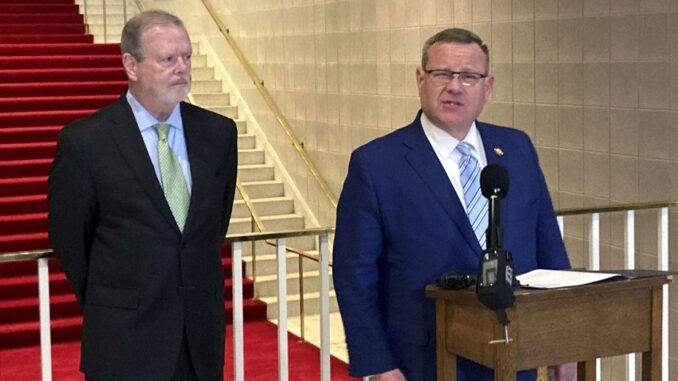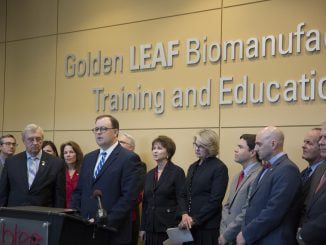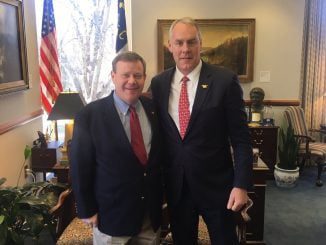
RALEIGH —Senate President Pro Tempore Phil Berger (R-Eden) and House Speaker Tim Moore (R-Kings Mountain) participated in a Feb. 26 panel hosted by the Charlotte Regional Business Alliance, speaking about legislative priorities like the city’s transportation plans along with the state’s rapidly growing job market and housing affordability.
Moore and Berger said they want to see the prioritizing of road infrastructure over projects like bike lanes and light rail in Charlotte’s transportation plans.
Moore said the top transportation priority “has to be roads,” with Berger adding that transportation is “one of those things a growing state has to get right.”
Charlotte city leaders are seeking a one-cent sales tax increase for various transportation projects that include more light and commuter rail corridors. The lawmakers said they’d like a more detailed proposal on how the money would be spent.
“We see so many roads that are choked up, constantly,” Moore said, adding that he is spending a lot of time in Charlotte lately and had found “every traffic hot spot” in the city and county while joking those were good spots for campaign yard signs.
While Berger is staying in his Senate leader role, Moore is finishing what will be his final term as House speaker and is currently running for the state’s 14th Congressional District. Moore is the longest-serving House speaker in state history, having taken up that role in 2015.
Charlotte can expect more congestion as it continues to expand and suburban sprawl spreads into neighboring counties.
“If you talk to developers, it’s one of the big issues,” Moore said.
The 2020 Census for Charlotte put the population at 874,607, an increase of more than 22.7% from the 2010 Census figure of 731,424. The U.S. Census Bureau’s 2022 estimate of Charlotte’s population, 897,720, is more than a 2.6% bump over 2020’s total.
Raleigh faces similar growth and traffic congestion issues, some of which may be partially alleviated with the completion of the I-540 outer beltline.
Last month, the U.S. Department of Transportation’s Build America Bureau approved a loan of up to $417.2 million for the North Carolina Turnpike Authority for Phase 2 of the Complete 540 Project in the Raleigh area. This is the fourth such loan, bringing the total to $1.3 billion.
Transportation may see discussions during the upcoming legislative session, but Berger said at a school choice week event in January, “The short session is probably going to be just a continuation of things that we’ve already done,” and that he had received “clear signals … that nobody wants to be there for a long period of time.”
Additionally, transportation-related issues have been the subject of multiple House Oversight and Reform Committee meetings in the past six months. In particular, lawmakers on the committee questioned N.C. Department of Motor Vehicles (NCDMV) Commissioner Wayne Goodwin over issues arising from the agency’s driver’s license contract. Similarly, concerns about NCDMV’s service abilities, long wait times and modernization have been long-standing issues that Sen. Michael Lazzara (R-Onslow) believes could be resolved by moving the department to the private sector.
On the issue of increasingly expensive child care costs, Berger highlighted the Tri-Share pilot program in the state budget, which aims to alleviate rising child care costs by splitting the financial burden into three parts — between the government, employers and parents.
The pilot is being implemented in three regions in the state.
Tri-Share’s funding was part of the 2023 state budget and included $900,000 in nonrecurring funds for each year of the 2023-25 fiscal biennium.
To qualify for Tri-Share, families need to be employed with a participating business and have a household income between 185% and 300% of the federal poverty level.



